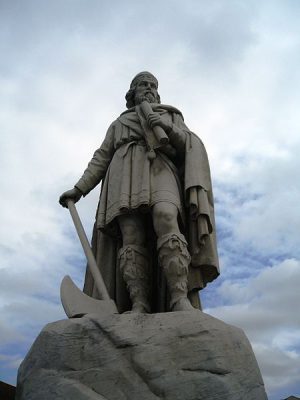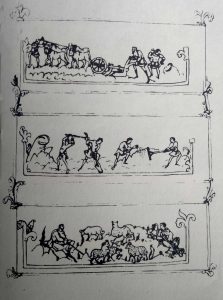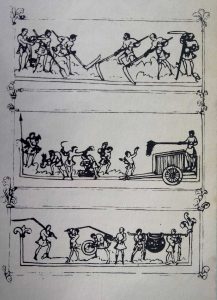 Pin
Pin Statue of King Alfred the Great (c.848-900) in his home town of Wantage in Berkshire. Alfred is renowned as a man of action, a warrior who fought tirelessly against the Viking invaders, but he also loved to read, according to the monk Asser who wrote his biography in the ninth century.
The first schools in England were started by monks, followers of the Christian faith brought to the country by Augustine in the year 597. Their pupils were the sons of Anglo-Saxon nobles — a very small privileged minority who thus learned to read and write.
The monks wrote the first text books themselves. They were Latin grammars and books on science, arithmetic and philosophy. Schoolboys and girls in Anglo-Saxon times had to copy out these text books word for word on their slates. They had no paper, which was expensive, and a slate had an advantage in that it could be wiped clean and used over and over again.
Anglo-Saxon children found it just as easy to learn as most young people do. But if they were bored, the monks would set them problems in the form of stories, so that they would find the sums easier to do. Here is a typical sum: “A swallow once invited a snail to dinner, The snail lived five kilometres away from the place where the swallow had its nest and it travelled along at the rate of only half a metre a day. How long would it take the snail to reach the swallow’s nest, where dinner was waiting?”
The monks, as teachers and book writers, were also the historians of the British Isles and it is from them that we have most of our knowledge of what happened in Britain between the departure of the Romans in A.D. 410 and the arrival of the Normans in 1066.
An unknown monk, or monks, set down in the seventh or eighth century the 6,356 short lines of verse which constitute the epic poem “Beowulf”, a story that interweaves fable, legend and history.
In it, Beowulf, the hero, has three great adventures: his slaying first of the monster Grendel, then of Grendel’s mother, another monster, and lastly a dragon, when he himself is killed. The poem tells us a great deal about the life and customs of Anglo-Saxon times.
Literary figure
Undoubtedly the greatest of all the literary monks, and the first great figure in English literature, was the Venerable Bede, a Tynesider who dominated early learning from around 670 to the year 735, when he died. Like all the monks of that time, Bede wrote in Latin, clearly, interestingly and never failing to include the small incidents and lively anecdotes that made his books classics of all time.
Bede’s greatest work was “The Ecclesiastical History of the English Nation” in which he tells how the English were converted to Christianity; how, at Whitby in 663, a council met to decide whether the English would follow the customs of the Celtic Church or the Roman Church, and by choosing the Roman Church, ensured that England’s history was henceforth linked with Europe’s.
Bede entered the monastery at Jarrow in Northumbria when he was seven. He was no traveller, although his learning brought him fame across Europe in his own lifetime. He refused promotion within the church and probably spent most of his life within the grey stone walls at Jarrow. He was, too, a great lover of that northern countryside where, he tells us, salmon leapt in the silver rivers, and seals, dolphins and whales were caught. There were also mussels, “in which were . . . pearls of all colours, red, purple, violet and green, but mostly white.”
It was Bede who gave us our system of dating. He called the year in which Christ was born the Year One, and dated all events from it. In fact, Christ was probably born earlier than Year One, but we still use Bede’s method today.
On his deathbed the remarkable monk of Jarrow was still hard at work dictating to his pupil monks a translation of St. John’s Gospel, urging the monks to write faster so that he could finish before he died. Hours after completing the last sentence, Bede was dead.
We know this, of course, because other monks were ‘writing down the events that were happening in eighth century England. More than a century after Bede, another monk, named Asser, wrote a ‘Life of King Alfred’, the great monarch who fought stubbornly against England’s Viking invaders. Asser’s book was certainly added to after his death, so that it can no longer be relied upon to be wholly accurate. Accepting this, it is nonetheless interesting to read what the book says.
Alfred, says Asser, loved reading, but he was never expert at it because “in those days there were no men really skilled in reading in the whole realm of the West Saxons”. It is in Asser’s book that we read of Alfred’s thoughtlessness that led to the incident of the burning cakes when he was in hiding — an episode that shows that the writer-monks had learned from Bede the importance of making a story interesting by including human details.
Human interest
Perhaps one of the most human of all stories about the birth of English literature, drawn from those centuries of mystery between the Roman withdrawal and the Norman invasion, concerns a peasant named Caedmon, who worked in the stables at Whitby Abbey and who eventually became the first English poet.
In the seventh century, after any bout of eating and drinking, it was the custom of each of the company in turn to sing or make rhymes. Caedmon, it seems, was not much good at either of these things and felt his lack of talent so keenly that when his turn came he would get up and go quietly outside.
On one such occasion he walked out to the stable where it was his job to take care of the horses. Caedmon settled himself into the hay and went to sleep. While he slept, he claimed afterwards, he saw a vision in which a man bade him sing. “Sing of the beginning of all created things,” the apparition urged him. Then Caedmon began to sing verses he had never heard before.
When he awoke he remembered all the verses he had sung and enthralled all the company at the next after-the-feasting gathering by repeating them. Caedmon was taken to the Abbess Hilda, who was in charge of Whitby monastery where he worked, and a council of wise men, who listened to his story. All concluded that there was no doubt that in a dream God had put verses into the heart of the ignorant peasant Caedmon.
The Abbess explained a part of the Bible to the stable hand who then apparently put the story into excellent verse. “Since God has given you this gift,” declared the Abbess, “you should become a monk in this monastery.”
Caedmon willingly concurred and used his new gift to such good effect that he who was once the monk’s servant was now their master, teaching them how to shape Biblical stories into Anglo-Saxon verse. Passed on by travelling minstrels, these verses not only enlivened those dark nights in the Dark Ages, but spread Bible teaching and the message of Christianity through a land where, although few could read or write, many could remember.
So, when Alfred the Great ruled over Southern England in the ninth century, there existed already an embryonic heritage of English literature, confined to the privileged few but already sufficiently well known to provide the basis of much learning.
The Danish invasion, which was temporarily repelled by Alfred, halted the spread of this knowledge for a time, for the marauding Danes destroyed the libraries until “there was not one house of learning left from the Forth to the Humber.” But when Alfred had driven the invaders out of southern England and his battles were over, he embraced learning avidly.
It was his great enthusiasm that helped the spread of knowledge and enlightenment in England and caused this inscription to be set many centuries later, on Alfred’s statue at Wantage in Berkshire:
“Alfred found learning dead and he restored it. Education neglected and he revived it. The laws powerless and he gave them force. The Church debased and he raised it. The land ravaged by a fearful enemy from which he delivered it, Alfred’s name will live as long as mankind shall respect the past.”
All this idyllism began to change distinctly for the worse, however, when the Normans arrived in England. William the Conqueror appointed his abbots not because of their piety or learning but because they were noblemen or warriors, and could keep the countryside in order. Some of them were as cruel and brutal as any battlefield mercenary.
One such infamous churchman was Toustain who, in 1083, arrived from Caen in Normandy to become Abbot of Glastonbury in Somerset. Like other Norman abbots in England, he began by cutting down the rations of his monks, in order, he said, to make them more docile. Then followed a whole series of new rules which, the monks decided, they would not obey.
Enraged, Toustain stormed out of the abbey and returned almost at once with a company of Norman soldiers. The terrified monks fled to the church and locked themselves behind the gate of the choir. But the soldiers burst into the church. Some climbed the beams and shot arrows down on to the crouching monks.
Meanwhile, other soldiers battered down the gate of the choir and charged the monks with swords and lances. They defended themselves as best they could with wooden benches and metal candelabra, but several of them were killed and many were wounded.
 Pin
Pin  Pin
Pin Farming in Saxon Times
A village depended on its crops and livestock for much of its food and clothing materials, so a great deal of effort was put into farming. These illustrations, taken from an old Saxon manuscript, show how the various activities were carried out.
The plough was drawn by oxen; in hoeing and raking the soil, the villeins worked as a team; sheep had to be guarded against predators; haymaking ensured there was food for the livestock during the winter. At harvest time, after the corn had been reaped, threshed and winnowed to separate the grain and remove the chaff, each strip owner received his share of the crop.
Adventurers
It is said that when William the Conqueror heard of this battle in Glastonbury Abbey he removed the abbot. But not long afterwards Toustain was apparently able to buy back his abbacy for five hundred pounds, whereupon he dispersed the monks among other monasteries and had them kept in close confinement.
With such adventurers as Toustain swarming into the monasteries, it is not surprising that in some of them gluttony – quickly took the place of fasting. So, we – are told, the monks of St. Austine in Canterbury used to have at least seventeen dishes at a meal, and their cook was renowned in Kent for the way he could create a dish to provoke the appetite.
And, says a Norman historian a trifle wistfully, he could mention many similar examples of monastic wickedness in the days of the Conqueror, were the subject not too painful to pursuie.
These were the first signs of a slow decline in the standards of the monasteries that was to last over the next few centuries.
About King Alfred the Great
Alfred’s reign faced numerous challenges, especially from Viking invasions that threatened the stability of England. However, he managed to successfully repel the Viking forces and negotiate treaties that brought periods of peace. During these times of relative tranquility, Alfred directed his attention towards reforming the education system and promoting literacy among his subjects.
To achieve his vision of a more educated nation, Alfred embarked on an ambitious project of promoting translation and dissemination of important works. He himself took an active role in translating Latin texts into English, making these valuable works accessible to a wider audience. One of the most notable translations undertaken by Alfred was that of Pope Gregory the Great’s “Pastoral Care.” This translation played a significant role in spreading religious knowledge and offering guidance to the clergy and the community at large.
Moreover, King Alfred initiated the compilation and translation of historical texts, including “The Anglo-Saxon Chronicle.” This chronicle, which chronicled the history of England from Roman times to Alfred’s own reign, became an essential source for subsequent historians. By preserving historical records through this Chronicle, Alfred ensured that future generations could trace the origin and evolution of their nation.
Apart from literature and history, Alfred also aimed to promote scientific and mathematical knowledge among his subjects. He encouraged the translation of important scientific and mathematical texts, such as the works of Bede and Boethius. Alfred believed that a well-rounded education encompassed not only literature and history but also the sciences, as they were vital for a prosperous nation.
Alfred’s contributions to English literature and education extended beyond his efforts in translation and compilation. He also implemented educational reforms, establishing schools, sponsoring scholars, and ensuring the distribution of books to those who could not afford them. His commitment to education was reflected in the establishment of a court academy, where he personally taught and engaged in scholarly discussions with his students.
Thanks to King Alfred’s patronage and dedication, the English language flourished, and a literary tradition began to take root. His efforts to preserve and promote literature and education laid the foundation for the future growth of English literature, making him a pioneer in the field.
King Alfred the Great’s reign was characterized by both his military achievements and his commitment to intellectual pursuits. His passion for literature, education, and culture earned him the title of the “Father of English Literature.” Through his translations, educational reforms, and patronage, Alfred made significant contributions to the preservation and promotion of literature, ultimately shaping the development of English literature for centuries to come.
King Alfred's translations and writings played a significant role in shaping the development of the English language. Here are a few ways in which his contributions influenced the language:
1. Preservation of Old English: King Alfred was instrumental in preserving Old English, also known as Anglo-Saxon, during a time when Viking invasions threatened its extinction. He translated important Latin texts into English, ensuring that the language stayed alive and continued to develop.
2. Standardization: King Alfred’s translations contributed to the standardization of English by establishing a consistent writing style and grammar. His translations helped set the foundation for a standardized language that would later be referred to as Middle English.
3. Vocabulary Expansion: Through his translations, King Alfred introduced numerous Latin words and phrases into English, expanding its vocabulary. This influence can still be seen today, as many English words have Latin origins.
4. Literary Influence: King Alfred’s writings, particularly his laws and educational texts, had a significant impact on the development of English literature. His work highlighted the importance of education and literacy, which fostered a culture of reading, writing, and storytelling in English.
King Alfred’s translations and writings not only helped preserve and standardize the English language but also laid the foundation for its future development and enrichment.
King Alfred's patronage and support for literature and education had a significant impact on the cultural and intellectual landscape of his time in several ways
King Alfred was an avid promoter of education and the dissemination of knowledge. He established a court school and invited scholars from different parts of Europe to teach there. He also issued a Royal Decree, known as Alfred’s Law Code, which mandated that every freeman should know how to read English, understand the law codes, and be proficient in Latin. This emphasis on education led to a rise in literacy rates among the nobility and the clergy, which in turn fostered a more informed and intellectually vibrant society.
King Alfred’s patronage of literature played a crucial role in the preservation and promotion of the English language. At a time when Latin was the dominant language of scholarship, he recognized the importance of English as a means of communication and cultural expression. He personally translated several works from Latin into English, such as Gregory the Great’s “Pastoral Care” and Boethius’ “Consolation of Philosophy,” making these texts more accessible to a wider audience. This not only helped to raise the status of the English language but also contributed to the development of a distinct English literary tradition.
Thirdly, King Alfred’s patronage of literature and education had a profound impact on the intellectual and cultural growth of his kingdom. It created an intellectual hub at his court, attracting scholars and fostering a vibrant intellectual exchange. This not only brought new ideas and learning from across Europe but also supported the production of original works in English. The court became a center of learning and culture, stimulating the growth of a national identity and fostering a sense of pride in English literature and history.
King Alfred’s patronage and support for literature and education had a transformative effect on the cultural and intellectual landscape of his time. It contributed to the rise of literacy, the preservation and promotion of the English language, and the intellectual and cultural growth of his kingdom. His legacy as a patron and advocate for education and literature continues to be celebrated and remembered as a golden age in English history.
King Alfred's translations and adaptations of important works from Latin made significant contributions to the formation of a distinct English literary tradition during the Middle Ages in several ways:
- 1. Preservation of knowledge: King Alfred sponsored the translation of numerous texts, including historical, philosophical, scientific, and religious works. By translating these works into Old English, he ensured that the knowledge contained within them was accessible to the English-speaking population. This preservation of knowledge helped shape the English literary tradition by making these texts part of the cultural and intellectual heritage of the English people.
- 2. Promotion of vernacular literature: King Alfred’s translations and adaptations were often done in Old English, the vernacular language spoken by the majority of the English population. By choosing to use the vernacular for these important works, Alfred elevated the status of Old English as a literary language and helped establish it as a viable medium for literary expression. This contributed to the development of an English literary tradition distinct from the Latin-dominated literary traditions of the time.
- 3. Integration of English and Latin traditions: In his translations, Alfred sought to maintain the essence and spirit of the original Latin texts while adapting them to the cultural and linguistic context of Anglo-Saxon England. By blending both English and Latin traditions, he fostered a synthesis that was uniquely English. This integration allowed for the growth of a literary tradition that drew from both indigenous English roots and the broader European intellectual tradition.
- 4. Promotion of literacy and education: King Alfred believed in the importance of education for the ruling elite as well as the general population. His translations and adaptations were intended to be accessible to a wider audience, promoting literacy and education among the English people. This emphasis on education and literacy laid the groundwork for the flourishing of English literature in later centuries, as a well-educated population became more receptive to and capable of producing original literary works.
King Alfred’s translations and adaptations of important Latin works played a crucial role in the formation of a distinct English literary tradition by preserving knowledge, promoting vernacular literature, integrating English and Latin traditions, and encouraging literacy and education. His efforts laid the foundation for the development of an English literary tradition that would continue to evolve and flourish in the centuries to come.
King Alfred's historical and cultural context greatly influenced his writings and their significance in English literary history. Here are some key ways in which his context shaped his works:
- 1. Viking Invasions: King Alfred lived during a time when England was under constant threat of Viking invasions. These invasions led to widespread destruction, devastation, and the disruption of learning and culture. Therefore, as a monarch tasked with defending his kingdom, Alfred recognized the importance of preserving and promoting English language and literature. This motivated him to champion the translation and dissemination of Latin works into English, ensuring their accessibility to a wider audience.
- 2. Educational Reform: Alfred was a proponent of education and sought to improve the state of learning in England. He founded schools and encouraged the translation of important works, such as religious texts, law codes, and historical writings, from Latin into English. By making knowledge more accessible to the English population, King Alfred helped foster a sense of national identity and pride, as well as re-establishing the importance of the English language.
- 3. Literary Traditions: Alfred drew inspiration from various literary traditions, including classical works, religious texts, and Anglo-Saxon poetry. He combined elements of these traditions in his own writings to create a unique English literary style that showcased his erudition and his desire to establish a distinctive English literary tradition. His writings, such as his translations of Boethius’ “Consolation of Philosophy” and Gregory the Great’s “Pastoral Care,” helped shape the development of English prose.
- 4. Christian Faith: Alfred was deeply religious and viewed his role as king in religious terms. His writings often contained Christian themes and moral teachings, reflecting his piety and his belief in the importance of faith in guiding both personal and political life. His works sought to educate and inspire his subjects, emphasizing the need for moral conduct and the pursuit of wisdom.
King Alfred’s historical and cultural context influenced his writings by spurring him to promote the use of English language and literature, reform the educational system, draw inspiration from diverse literary traditions, and infuse his works with Christian values. His efforts helped lay the foundations for the development of English prose and contributed to the preservation and advancement of English culture during a tumultuous period in English history.
King Alfred's translation of important historical and religious texts had a significant impact on the dissemination of knowledge and the development of English as a written language
- 1. Dissemination of Knowledge: Prior to King Alfred’s translations, most scholarly and religious texts were written in Latin, which limited their accessibility to only a small elite who were proficient in Latin. By translating these texts into English, King Alfred made them accessible to a much wider audience, including the common people and the emerging English clergy. This helped spread knowledge, information, and ideas among the general population, fostering a more educated and informed society.
- 2. Development of English as a Written Language: King Alfred’s translations played a crucial role in the development of English as a written language. At that time, Old English (also known as Anglo-Saxon) was primarily an oral language, with limited written materials available. By translating important texts into English, King Alfred demonstrated the potential and versatility of the English language as a means of written communication. His translations set a precedent for using English for scholarly, religious, and administrative purposes, encouraging other writers to follow suit and contribute to the growth of the English written tradition.
- 3. Promotion of Anglo-Saxon Culture: King Alfred’s translations helped promote and preserve Anglo-Saxon culture during a time when Viking invasions posed a threat to the kingdom. By translating important historical and religious texts, he not only made them accessible to English-speakers but also highlighted the accomplishments of Anglo-Saxon scholars and thinkers. This helped solidify the cultural identity of the Anglo-Saxon people and foster a sense of national pride.
King Alfred’s translations had a profound impact on the dissemination of knowledge, the development of English as a written language, and the promotion of Anglo-Saxon culture. They contributed to a more educated society, increased the use and recognition of English as a written language, and played a role in preserving and celebrating the Anglo-Saxon heritage.
Frequently Asked Questions: King Alfred the Great
King Alfred the Great, born in 849 AD, was a renowned English monarch who ruled between 871 and 899 AD. He is often referred to as the Father of English Literature due to his immense contributions in promoting education and literature during his rule.
King Alfred played a pivotal role in reviving and promoting English literature during a time when Latin was the dominant language of scholarship. He ensured that important texts were translated into English, making them accessible to a wider audience.
King Alfred personally translated or had translated many significant works into English during his reign. Some of the notable texts include the “Historia Ecclesiastica” by Bede, the “Soliloquies” by St. Augustine, and Gregory the Great’s “Pastoral Care.” He also encouraged the translation of various religious and historical works.
Alfred’s translations had a profound impact on English literature as they helped lay the foundation for the development of English as a language of literary expression. By translating these works, he ensured that English-speaking people had access to important knowledge and ideas, stimulating intellectual growth within the kingdom.
While King Alfred is primarily known for his translations, he also wrote several original works. The most significant among them is his series of laws known as “Alfred’s Law Code” or “Domboc.” These laws aimed to promote justice and fairness in his kingdom and are considered one of the earliest examples of written English law.
King Alfred’s dedication to education is demonstrated by his establishment of schools throughout his kingdom. He invited scholars from across Europe, fostering a vibrant intellectual environment. Under his patronage, manuscripts were created and preserved, and education became a priority for both clergy and commoners.
King Alfred believed that education and literature were essential for the betterment of his people and the progress of his kingdom. He recognized the importance of knowledge and sought to enhance the intellectual capabilities of his subjects. He believed that a well-educated populace would be better equipped to govern, administer justice, and contribute to the overall well-being of society.
Yes, King Alfred’s efforts were largely successful. His translations made important works more accessible to a broader audience, and his emphasis on education led to the flourishing of learning and intellectualism in his kingdom. His reign marked a turning point in the history of English literature, laying the groundwork for future literary developments.
King Alfred’s legacy in English literature is profound. His translations and original works paved the way for the development of English as a language of literary expression. His emphasis on education and patronage of scholars created an intellectual renaissance, leading to a rich literary tradition that would continue to evolve throughout the centuries.
King Alfred’s contributions to English literature and education have solidified his place in history. He is remembered as a wise and just ruler who promoted the advancement of his people through intellectual pursuits. His reign is seen as a pivotal period in the development of English literature, and he is honored as one of the most important figures in the country’s cultural heritage.





























